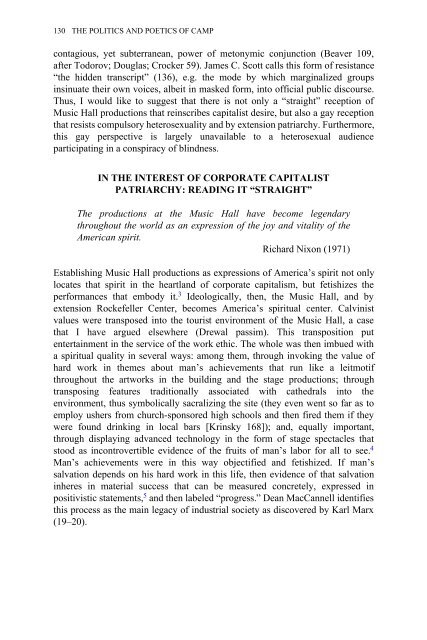Edited by Moe Meyer - Get a Free Blog
Edited by Moe Meyer - Get a Free Blog
Edited by Moe Meyer - Get a Free Blog
You also want an ePaper? Increase the reach of your titles
YUMPU automatically turns print PDFs into web optimized ePapers that Google loves.
130 THE POLITICS AND POETICS OF CAMP<br />
contagious, yet subterranean, power of metonymic conjunction (Beaver 109,<br />
after Todorov; Douglas; Crocker 59). James C. Scott calls this form of resistance<br />
“the hidden transcript” (136), e.g. the mode <strong>by</strong> which marginalized groups<br />
insinuate their own voices, albeit in masked form, into official public discourse.<br />
Thus, I would like to suggest that there is not only a “straight” reception of<br />
Music Hall productions that reinscribes capitalist desire, but also a gay reception<br />
that resists compulsory heterosexuality and <strong>by</strong> extension patriarchy. Furthermore,<br />
this gay perspective is largely unavailable to a heterosexual audience<br />
participating in a conspiracy of blindness.<br />
IN THE INTEREST OF CORPORATE CAPITALIST<br />
PATRIARCHY: READING IT “STRAIGHT”<br />
The productions at the Music Hall have become legendary<br />
throughout the world as an expression of the joy and vitality of the<br />
American spirit.<br />
Richard Nixon (1971)<br />
Establishing Music Hall productions as expressions of America’s spirit not only<br />
locates that spirit in the heartland of corporate capitalism, but fetishizes the<br />
performances that embody it. 3 Ideologically, then, the Music Hall, and <strong>by</strong><br />
extension Rockefeller Center, becomes America’s spiritual center. Calvinist<br />
values were transposed into the tourist environment of the Music Hall, a case<br />
that I have argued elsewhere (Drewal passim). This transposition put<br />
entertainment in the service of the work ethic. The whole was then imbued with<br />
a spiritual quality in several ways: among them, through invoking the value of<br />
hard work in themes about man’s achievements that run like a leitmotif<br />
throughout the artworks in the building and the stage productions; through<br />
transposing features traditionally associated with cathedrals into the<br />
environment, thus symbolically sacralizing the site (they even went so far as to<br />
employ ushers from church-sponsored high schools and then fired them if they<br />
were found drinking in local bars [Krinsky 168]); and, equally important,<br />
through displaying advanced technology in the form of stage spectacles that<br />
stood as incontrovertible evidence of the fruits of man’s labor for all to see. 4<br />
Man’s achievements were in this way objectified and fetishized. If man’s<br />
salvation depends on his hard work in this life, then evidence of that salvation<br />
inheres in material success that can be measured concretely, expressed in<br />
positivistic statements, 5 and then labeled “progress.” Dean MacCannell identifies<br />
this process as the main legacy of industrial society as discovered <strong>by</strong> Karl Marx<br />
(19–20).


